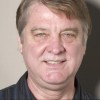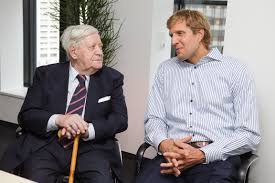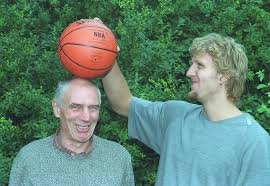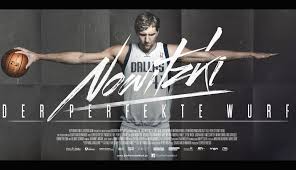 When Dirk Nowitzki met Helmut Schmidt in 2013, the former German Chancellor offered what he considered to be sage advice, unaware that in the lucrative world of the NBA, his suggestion would be more humorous than practical.
When Dirk Nowitzki met Helmut Schmidt in 2013, the former German Chancellor offered what he considered to be sage advice, unaware that in the lucrative world of the NBA, his suggestion would be more humorous than practical.
Schmidt asked Nowitzki his age, which was almost 35 at the time. Schmidt then asked if Nowitzki could play another 10 years in the NBA and Nowitzki said no, playing past 40 was not really feasible.
 So Schmidt, being practical, said Nowitzki should prepare for the future, study something so he could have a way to make a living after his sports career had ended.
So Schmidt, being practical, said Nowitzki should prepare for the future, study something so he could have a way to make a living after his sports career had ended.
Nowitzki, who had earned close to $200 million at the time, stammered and managed to say he had dabbled in studying business. Schmidt nodded his approval. Afterward, Nowitzki recounted the story to friends and admitted the advice caught him off-guard so he responded the only way he could think of at the time.
“I lied,” he said.
The scene with Schmidt is one of the many highlights of the 105-minute documentary Nowitzki: The Perfect Shot that will be in U.S. theaters beginning July 10. The film is two-year project from German Emmy Award-winning filmmaker Leopold Hoesch, whose crew set out to document the path traveled by one of the greatest athletes in German sports history.
They succeed impressively. Perhaps a documentary on Nowitzki is not your idea of an exciting night at the movies. It probably will not be a box office threat to Jurassic World.
 But Hoesch and director Sebastian Dehnhardt have produced an entertaining, clever, thorough look at Nowitzki, including a fascinating examination of his relationship with Holger Geschwindner, his personal coach.
But Hoesch and director Sebastian Dehnhardt have produced an entertaining, clever, thorough look at Nowitzki, including a fascinating examination of his relationship with Holger Geschwindner, his personal coach.
Geschwindner, who was once the captain of the German national team, saw Nowitzki play in a youth league game, and it was evident the tall and gangly player had enormous potential. Geschwindner offered to be Nowitzki’s personal coach and that began a relationship that has now lasted more than 20 years.
Although Nowitzki is one of the most laid-back of superstars, he has a tremendous work ethic. Geschwindner is a physicist and taskmaster who pushes Nowitzki in rigorous physical training, but he also has developed a series of formulas in an effort to create the perfect arc for jump shots. The formulas involve player’s height, arm length and the height of the basket to determine the optimum release point. “Take differential and integral calculus,” he once told Time magazine, “make some derivations and create a curve. Everybody can do it.”
In describing the Nowitzki jump shot and secret behind his free throw shooting – despite being 7-0, Nowitzki ranks 14th in lifetime free throw percentage at .879 and everyone ahead of him is shorter – there are computer stick figures with lines, angles and arcs on the screen and things like “kinetic motion” and “Mars” are applied to basketball.
Although the idiotic theory that Nowitzki is soft has been effectively destroyed the last few years, the subject is explored effectively. One of the video clips is the 2001 playoff game between the Mavericks and Spurs when Nowitzki had a tooth knocked out, but after treatment in the locker room, he returned to play and led the Mavericks to a win, scoring 30 points with 9 rebounds. Nowitzki had already battled a case of food poisoning in the series.
Watching that makes you wonder how the silly soft theory even got started.
 At a screening of the movie last week in Dallas, Nowitzki said his easygoing nature led to several small surprises, but one big one. In 2009, friends – including Geschwindner – intervened in a relationship Nowitzki had with a woman named Cristal Taylor. Nowitzki had rejected advice from family and friends and planned on marrying Taylor, but it was discovered she had used a variety of fake names and had an outstanding warrant. She was arrested at Nowitzki’s home and later served time in prison for violating probation in a decade-old forgery and theft case.
At a screening of the movie last week in Dallas, Nowitzki said his easygoing nature led to several small surprises, but one big one. In 2009, friends – including Geschwindner – intervened in a relationship Nowitzki had with a woman named Cristal Taylor. Nowitzki had rejected advice from family and friends and planned on marrying Taylor, but it was discovered she had used a variety of fake names and had an outstanding warrant. She was arrested at Nowitzki’s home and later served time in prison for violating probation in a decade-old forgery and theft case.
“Last summer, the movie guys wanted me to watch it and give them some input,” Nowitzki said, “but I said ‘No, I don’t want to see it.’ I wanted to see it in the premiere. I wanted to be excited, I wanted to be fired up when we win it all and I wanted to relive the whole thing live so I didn’t watch it until the premiere. I was a little overwhelmed watching it at a movie theater. It was packed.”
So imagine Nowitzki’s surprise when Taylor appeared on the screen and details were rehashed.
“They actually put some parts on my private life and I was shocked – what happened with my ex and stuff,” Nowitzki said, laughing. “I didn’t even know they had put that in. So when I was in the movie theater I was like ‘whoa. They went there, huh. OK. That’s sweet.’ So they surprised me with a few things, but that’s a good thing. It’s not only a highlight reel. They show everything. I think in the end, it ended up being a great product.”
Again, Nowitzki: The Perfect Shot will not be a blockbuster. It may not be a must-see for the basketball fanatic, but it is definitely a should-see.
And a word to coaches, especially at the youth level. This would be an ideal film for a team function, no matter which sport, because it is an extensive look at the tedium of working to achieve greatness.
“A big part of it obviously is also how hard you have to work to get to this point so it’s not like [anything] is given to you,” Nowitzki said. “They followed me for two years but they also followed me to a lot of gyms. I might be in a commercial shoot in Majorca and I’m going to the gym with Holger and they go film at random school gym in Majorca. That’s also something that comes out. I might have the talent and the height, but nothing’s given to you. And that’s part of the movie that’s good to see for kids.”
At the end of the film, Nowitzki is driving in a car and marvels at how people make him out to be such a heroic figure. He notes that all he does is shoot the basketball well, but people want his autograph and his photo and that amazes him.
It is a good ending to a positive story of someone who sees himself as a regular guy – while while the rest of us marvel at his extraordinary talent.
(RELATED: NOWITZKI NOT PROPERLY RECOGNIZED AS AN ALL-TIME GREAT)
Jan Hubbard has written about basketball since 1976 and worked in the NBA league office for eight years between media stints. Follow him on Twitter at @whyhub.